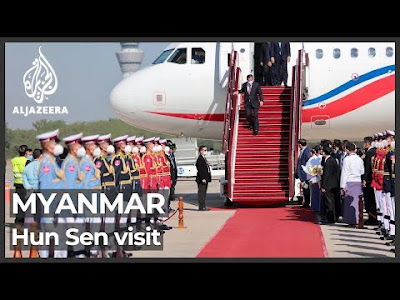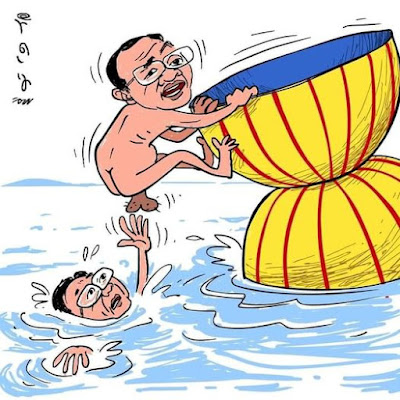(Based on the staff article from the MYANMAR NOW on January 05, 2022.)
Forty-years-long-ruling Cambodia Dictator Hun Sen
recently had visited Myanmar and cordially met Myanmar Dictator Min Aung Hlaing
despite the ASEAN boycotting Myanmar Dictator who has been killing his fellow
Burmese in thousands for uprising against his bloodied military dictatorship.
Cambodian Dictator Hun Sen who has all but wiped out political opposition by killing them all is now trying to establish a political dynasty in Cambodia by promoting his son General Hun Manet as the deputy chief of military and his heir apparent. Hun Sen is now using Cambodia’s position as 2022 revolving-chair of ASEAN to groom Min Aung Hlaing out of the wilderness into a respectable statesman by legitimizing Myanmar ruling junta.
ASEAN has
shunned Min Aung Hlaing after he failed to honor his promise to implement the
five-point consensus agreed with ASEAN at ASEAN Summit in April. ASEAN then
blocked Min Aung Hlaing from attending the October ASEAN Summit and blacklisted
Myanmar.
Hun Sen Is A Mass Killer Like Min Aung Hlaing
Soldiers loyal
to Cambodian leader Hun Sen have methodically targeted and executed at least 40
military officers or officials from the opposing royalist political party that
he deposed in the 1997-July coup, according to a United Nations report
presented yesterday to Hun Sen by a senior U.N. official.
The report
blames some of the deaths on an elite special forces unit that figured
prominently in the coup and allegedly tortured more than 30 military personnel.
It further identifies an apparent killing field for Hun Sen's victorious
forces, an area roughly 60 miles southwest of the capital that multiple U.N.
sources cited "as a location where many . . . loyalists {of the opposing
party} were executed and their bodies secretly buried."
Some of the
victims described in the U.N. report died after being shot in the temple, the
mouth, or the chest while others were beheaded, strangled or their throats
slit. Many of their bodies were hurriedly incinerated in pagodas, under
military orders, while others were buried in shallow graves or dumped next to highways
leading from the capital, according to the report.
"There
appears to be a pattern of the deliberate targeting of certain senior {opposing
party} officers and their key associates and subordinates," states the
24-page report, which was prepared by the Cambodia office of the United Nations
Center for Human Rights in response to a public demand by Hun Sen for proof of
alleged human rights abuses associated with his coup.
Most of the
deaths described in the U.N. report occurred during the first week of fighting
in the July 2-7 military operation orchestrated by Hun Sen against forces
allied with Cambodia's first prime minister, Prince Norodom Ranariddh. The
prince fled the country and since then has seen the destruction of his
political party, known by its French acronym as Funcinpec.
The Hun Sen’s
loyal colonel who headed the elite 911 Airborne Brigade responsible for most of
the mass killing was not punished and later promoted to a general ready to kill
for Hun Sen again.
General Hun Manet: A Cambodian dynasty?
Hun Sen is now
68 and has led Cambodia for nearly four decades. As a veteran political
tactician growing old and less popular, especially among young people, Hun Sen
probably wonders how he can exit from politics without negative consequences.
Even though he
has said that his ruling party will remain at the helm for up to a century, he
cannot be sure that either he or his family will be secure after he steps down.
This apprehension seems to be key in shaping Cambodia’s politics in the years
ahead. For now, without much obstruction from the opposition, Hun Sen appears
confident and ready to anoint his son Hun Manet as his successor.
This week,
Cambodia’s Prime Minister Hun Sen confirmed what has long been suspected, that
he is grooming his eldest son, Hun Manet, for leadership of the country. “As
his father,” Hun Sen declared, “I have to support my son and train him so that
he is capable”.
Not that
Cambodia is likely to see a handover to a successor soon. Hun Sen also made
clear he intends to continue in the top job for another ten years. Widely seen
as a “strongman”, Hun Sen has been Cambodia’s prime minister since 1985.
Hun Manet,
presently a three-star general in the Royal Cambodian Armed Forces*, has been
the subject of speculation after speculation that he will be the next non-royal
crown prince in Cambodia’s politics. In recent years, he has received a series
of high-profile promotions.
In 2018, he was
promoted to the second-highest rank in Cambodia’s military. Later, he was voted
into the Cambodian People’s Party (CPP) permanent committee. This month, he was
promoted from a deputy to head of the CPP’s central youth wing.
Being afraid of
revenge attacks from the families of his victims, Hun Sen wants to make sure
none of his contemporaries will have political power. On December-29, Hun Sen
announce that he will limit the age of Cambodian prime ministers not to exceed
72.
He has a solid
reason for that announcement for he will be 72 in 2024 and he is planning to
transfer power to the new prime minister elected by late-2023 general
elections. He is grooming Hun Minet to become prime minister so that he can
safely retire from the politics by then.









